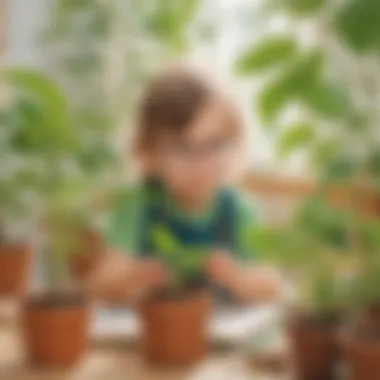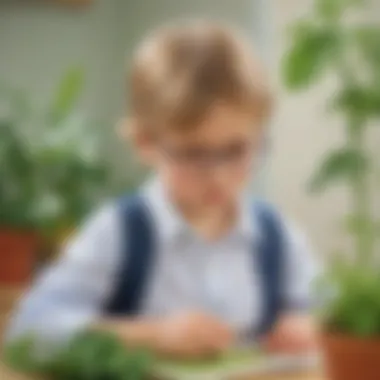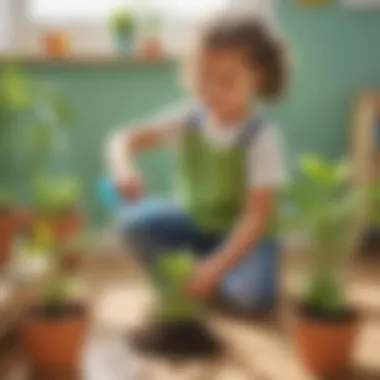Engage Young Minds: Discover Fun Plant Science Activities for Preschoolers


Fun Activities Ideas
As we delve into the enchanting world of plant science activities for preschoolers, it's essential to create a balance between indoor and outdoor exploration. For indoor activities, consider setting up a mini-garden station where young learners can observe plant growth firsthand. Engaging in activities like seed planting, watering, and observing germination can instill a sense of wonder and connection to nature. Additionally, fostering creativity through arts and crafts projects centered around plant themes can enhance children's tactile skills and imagination.
Outdoor Adventures
Venturing into the great outdoors provides a rich learning experience for preschoolers interested in plant science. Take nature walks in local parks or botanical gardens to observe different plant species up close. Encourage children to touch, smell, and closely inspect various plants to develop their sensory perception. Engaging in activities like leaf rubbings, collecting plant specimens, and creating nature journals can deepen their understanding of botanical diversity.
Arts and Crafts
Artistic expression through plant-themed crafts can be both educational and enjoyable for young learners. Encourage children to create botanical-inspired artwork using materials like leaves, flowers, and twigs. Craft projects such as pressed flower collages, leaf printing, and nature weaving can foster creativity and an appreciation for the intricate beauty of plants. These hands-on activities also provide opportunities for children to learn about different plant parts and functions.
Science Experiments
Introduce preschoolers to the wonders of plant science through interactive and engaging experiments. Conduct simple experiments like planting seeds in different growing mediums to explore the concept of germination. Use basic household items to demonstrate concepts like photosynthesis and transpiration in a fun and accessible way. Hands-on experiments allow young learners to observe scientific principles in action and cultivate a lifelong interest in the natural world.
Cooking and Baking
Incorporating plant-based cooking and baking activities can further enrich preschoolers' exploration of plant science. Encourage children to participate in simple recipes using ingredients like fruits, vegetables, and herbs. Cooking projects such as preparing salads, smoothies, or herb-infused dishes can teach children about plant diversity, nutrition, and healthy eating habits. Engaging in hands-on cooking experiences also reinforces the connection between plants and the food we eat on a daily basis.
Introduction to Plant Science
In this segment, we delve into the vital realm of plant science, an essential foundational topic for young learners. Introducing preschoolers to plant science opens doors to understanding the natural world around them, sparking curiosity and laying the groundwork for future scientific exploration. Plant science provides a hands-on and interactive approach to learning, allowing children to engage with nature in a meaningful way. By exploring plant life, preschoolers develop a deeper appreciation for the environment and the living organisms that inhabit it.
Understanding Plant Life
The Basics of Plant Anatomy


The Basics of Plant Anatomy focuses on the fundamental structure of plants, encompassing essential components like roots, stems, leaves, and flowers. Understanding plant anatomy is crucial as it aids in recognizing different plant species and their unique characteristics. By grasping the basics of plant anatomy, preschoolers can comprehend how plants grow, reproduce, and adapt to their environments. This knowledge forms a solid foundation for further botanical studies, nurturing a scientific mindset in young learners.
Importance of Plants in Our Ecosystem
Exploring the importance of plants in our ecosystem sheds light on the indispensable role vegetation plays in sustaining life on Earth. Plants provide oxygen, food, shelter, and habitat for various organisms, emphasizing their significance in maintaining ecological balance. Understanding the interdependence between plants, animals, and humans cultivates environmental awareness in preschoolers. Teaching the importance of plants in our ecosystem instills a sense of responsibility towards nature and encourages conservation efforts from a young age.
Engaging Preschoolers
Incorporating Playful Learning Methods
Incorporating playful learning methods enlivens plant science education for preschoolers by introducing fun and interactive elements into the learning process. Playful activities like games, role-plays, and hands-on experiments make learning about plants enjoyable and memorable. By incorporating playfulness, educators can capture children's interest and foster a positive attitude towards learning. Playful learning methods not only enhance engagement but also stimulate creativity and problem-solving skills in young learners.
Creating Hands-On Experiences
Creating hands-on experiences allows preschoolers to explore plant science through direct sensory interactions with plants and nature. Activities such as planting seeds, observing plant growth, and conducting experiments facilitate experiential learning. Hands-on experiences promote active participation and cognitive development in children, helping them retain information effectively. By engaging in hands-on activities, preschoolers develop a deeper understanding of plant biology and ecology, laying a strong educational groundwork for their future exploration of the natural world.
Interactive Plant Science Activities
In the realm of preschool plant science education, interactive activities play a pivotal role in engaging young learners and fostering a deep-rooted appreciation for nature. These activities transcend traditional teaching methods by immersing children in hands-on experiences that ignite their curiosity and fuel their knowledge acquisition from a tender age. By incorporating playful learning techniques and creating sensory-rich environments, interactive plant science activities cater to the unique ways preschoolers explore and understand the natural world. Through these activities, children not only learn about the importance of plants but also develop crucial observation skills, critical thinking abilities, and a lifelong love for botanical sciences.
Seed Exploration
Seed Sorting and Matching
Seed sorting and matching activities offer preschoolers a tactile and visual experience that enhances their understanding of seeds and plant diversity. By engaging in tasks that involve categorizing seeds based on size, shape, color, or texture, children develop cognitive skills and fine motor abilities. This activity also introduces the concept of seed identification and encourages children to pay attention to detail, fostering their observational capabilities. Seed sorting and matching not only boost children's plant knowledge but also stimulate their curiosity about the natural world, laying a strong foundation for future botanical studies.
Seed Germination Experiments


Seed germination experiments provide preschoolers with a hands-on opportunity to witness the miraculous journey of a seed sprouting into a new plant. Through this activity, children learn about the germination process, the importance of water and sunlight for plant growth, and the fragility of early plant stages. By conducting germination experiments, preschoolers develop an appreciation for the life cycle of plants and gain a deeper understanding of the vital role seeds play in sustaining plant life. This hands-on experience not only cultivates a sense of wonder and discovery but also instills a sense of responsibility as children care for their growing seeds.
Planting Adventures
Creating a Mini Herb Garden
Introducing preschoolers to the art of cultivating a mini herb garden not only teaches them about plant care but also provides a sensory-rich experience that stimulates their senses. Children learn about different herb varieties, soil preparation, watering schedules, and the importance of sunlight for plant growth. Cultivating a mini herb garden allows children to witness the magic of seed-to-plant transformation up close, fostering a connection to the natural world and instilling a sense of environmental stewardship. This activity nurtures a child's patience, responsibility, and appreciation for the beauty and functionality of plants.
Observing Plant Growth
The activity of observing plant growth empowers preschoolers to witness the incremental changes that occur as plants develop from seeds to mature specimens. By closely monitoring plant growth, children learn about the impact of external factors such as light, water, and soil on plant health and vitality. This hands-on experience cultivates children's sense of curiosity and wonder, as they witness the transformation of a tiny seed into a thriving plant. Observing plant growth not only enhances a child's knowledge of botany but also fosters a sense of connection to nature and an understanding of the interconnectedness of living organisms.
Nature Walk Discoveries
Identifying Local Flora
Engaging preschoolers in activities that involve identifying local flora encourages them to explore their natural surroundings and discover the diverse plant species in their environment. Through interactive experiences such as leaf identification, flower matching, and tree observation, children develop an appreciation for the richness of their local ecosystem. This activity instills in children a sense of environmental awareness and conservation, as they learn to recognize and respect the plants that contribute to the beauty and balance of their surroundings. Identifying local flora sparks children's curiosity about biodiversity and ecosystems, laying the groundwork for future ecological studies.
Collecting Leaves and Flowers
Collecting leaves and flowers during nature walks allows preschoolers to engage their senses, develop their observation skills, and cultivate a sense of wonder about the natural world. By collecting plant specimens, children learn about the diversity of shapes, colors, and textures in leaves and flowers, enhancing their botanical knowledge. This hands-on activity encourages children to explore the intricate details of plants, sparking their creativity and fostering a deeper connection to nature. Collecting leaves and flowers not only promotes sensory exploration but also instills in children a sense of wonder and appreciation for the beauty and diversity of plant life.
Crafts Inspired by Plants
Leaf Rubbing Art
Leaf rubbing art is a creative and engaging activity that allows preschoolers to explore the textures and patterns of leaves in a visual and tactile manner. By placing leaves under paper and rubbing over them with crayons or chalk, children create unique artworks that showcase the intricate details of nature. This activity not only fosters creativity and fine motor skills but also helps children develop an appreciation for the aesthetic qualities of plants. Leaf rubbing art enables children to express their observations of nature and encourages them to interact with plants in a novel and artistic way, fostering a deeper connection to the natural world.


Nature Collage Creations
Nature collage creations offer preschoolers a hands-on opportunity to artistically represent the beauty and diversity of plants through mixed-media artworks. By collecting natural materials such as leaves, flowers, and seeds, children can create collages that celebrate the colors, shapes, and textures found in the plant kingdom. This creative activity promotes imagination, artistic expression, and an appreciation for the intricacies of plant life. Nature collage creations not only provide a platform for children to engage with nature creatively but also inspire a deeper understanding and respect for the environment and its diverse flora.
Educational Benefits
As we delve into the realm of 'Educational Benefits' within the context of preschool plant science activities, it is crucial to grasp the significance of instilling early exposure to science in young learners. Plant science not only introduces children to the wonders of nature but also lays the foundation for critical thinking and observation skills. By engaging in hands-on activities such as seed exploration and planting adventures, preschoolers develop a sense of curiosity and inquiry that forms the basis of their educational journey. The interactive and immersive nature of these activities fosters a love for learning and nurtures a deeper understanding of the world around them.
Promoting Curiosity and Inquiry
Encouraging Scientific Exploration
Encouraging scientific exploration among preschoolers is pivotal in shaping their cognitive development and fostering a sense of wonder towards the natural world. By engaging in activities that promote questioning, experimentation, and observation, young learners hone their analytical skills and nurture a mindset of inquiry. The hands-on approach to scientific exploration not only stimulates intellectual growth but also instills a lifelong passion for learning. Through encouraging scientific exploration, children develop a sense of autonomy and a thirst for knowledge that extends beyond the classroom.
Fostering a Love for Nature
Fostering a love for nature in preschoolers goes beyond mere appreciation for the environment; it cultivates a sense of responsibility towards the Earth and its ecosystems. By immersing young minds in activities that showcase the beauty and complexity of the natural world, educators and parents spark a sense of awe and reverence for the interconnectedness of all living things. Through fostering a love for nature, children not only develop empathy and care for the environment but also cultivate a broader perspective that transcends individual boundaries.
Enhancing Cognitive Skills
Developing Observation Skills
The development of observation skills in preschoolers through plant science activities offers a unique opportunity to sharpen their cognitive abilities. By encouraging children to closely examine plant life, identify patterns, and make connections, educators lay the groundwork for enhanced critical thinking and problem-solving skills. Observing the growth stages of plants instills patience and attention to detail, essential traits for developing a scientific mindset. Through developing observation skills, young learners cultivate a habit of keen perception and attention to detail that transcends the realm of plant science.
Building Critical Thinking
Building critical thinking skills in preschoolers through plant science activities equips them with the tools to analyze, evaluate, and draw conclusions based on evidence. Engaging in hands-on experiments and nature-based projects provides children with opportunities to think critically, make informed decisions, and demonstrate reasoning skills. The process of engaging in plant-related tasks challenges young minds to think beyond surface-level observation and delve deeper into the intricacies of the natural world. Through building critical thinking skills, preschoolers acquire the ability to approach problems analytically and creatively, setting a strong foundation for academic and lifelong success.
Conclusion
Nurturing Young Botanists
In the subsection dedicated to nurturing young botanists, the focus is on cultivating a profound interest in plant science that transcends routine learning activities. By igniting a passion for plant science, children are exposed to the captivating world of botanical wonders, igniting a spark of curiosity that fuels their desire to learn more. This section delves into the specific aspect of instilling a deep-seated love for plant science through hands-on experiences, engaging experiments, and interactive learning. The unique characteristic of igniting a passion for plant science lies in its ability to bridge the gap between theoretical knowledge and practical exploration, making learning a dynamic and thrilling endeavor for young learners.
- Igniting a Passion for Plant Science: This aspect involves creating a sense of wonder and excitement about plant science through captivating demonstrations, curious experiments, and engaging discussions. By sparking this initial interest, children are motivated to seek out more information, conduct their investigations, and develop a genuine fondness for the subject. The main advantage of igniting a passion for plant science lies in its potential to cultivate a lifelong curiosity and appreciation for the natural world, setting the stage for a future enriched with scientific exploration and discovery.
- Cultivating Lifelong Learning: The section on cultivating lifelong learning delves into the process of nurturing a continuous pursuit of knowledge and discovery in young botanists. By fostering a culture of inquiry, critical thinking, and persistence, this aspect ensures that children not only acquire knowledge but also develop the skills necessary to explore new horizons independently. The key characteristic of cultivating lifelong learning is its emphasis on instilling a growth mindset, where challenges are viewed as opportunities for growth, and failures are seen as stepping stones toward success. By promoting this approach, educators and parents can empower children to embrace lifelong learning as a rewarding and enriching journey filled with endless possibilities for growth and self-discovery.



